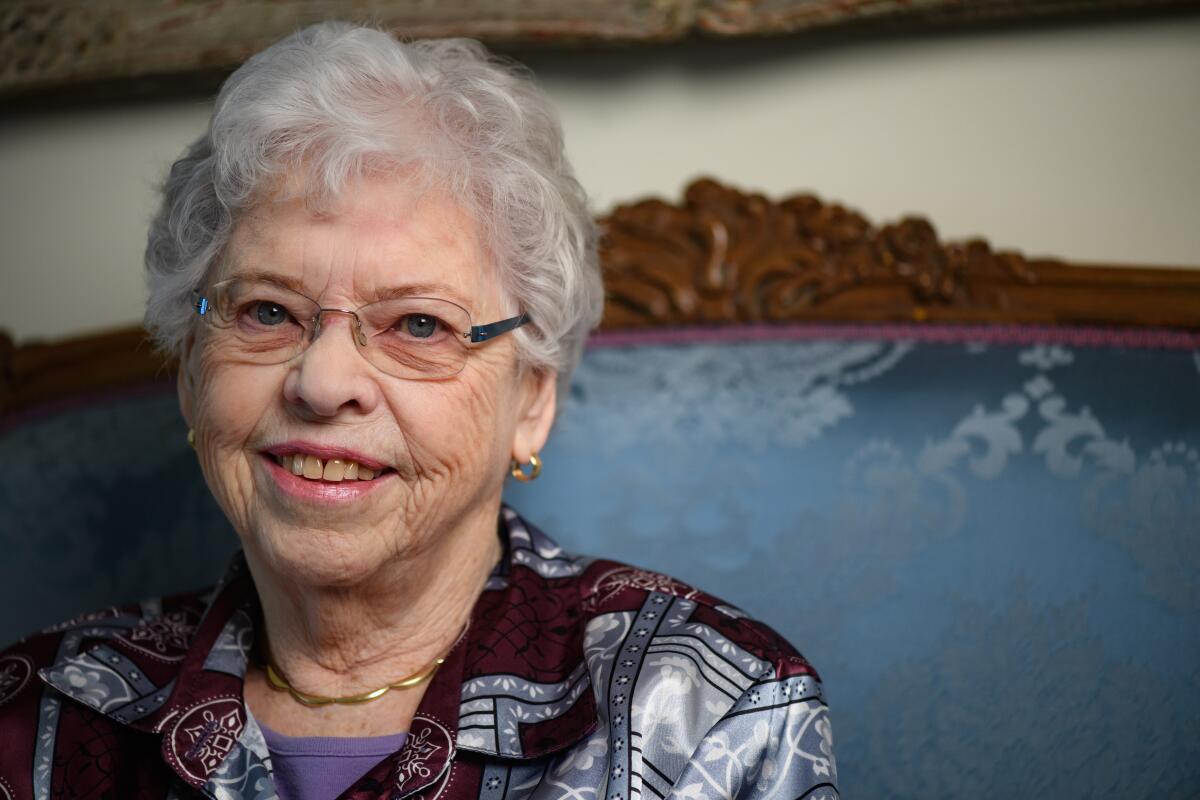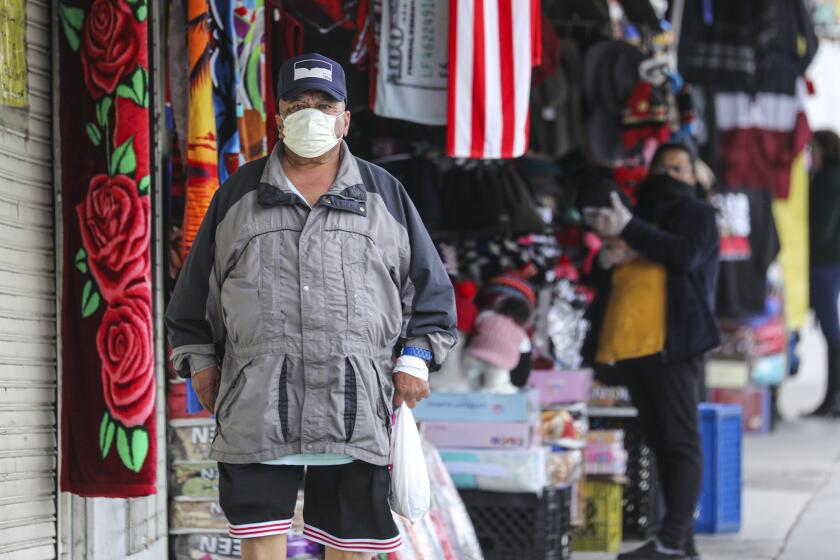Would Mister Rogers know how to make us feel better right now?

- Share via
Joanne Rogers has been getting a lot of phone calls this week. Which makes sense, because she is 92, and lives alone in an apartment in Pittsburgh, and everyone wants to make sure she is OK.
She is OK, by the way — she’s self-isolating, has plenty of friends who are willing to drop off groceries and has no symptoms of the coronavirus.
But there’s another reason Joanne’s phone has been ringing off the hook lately. People want to know what wisdom she thinks her late husband, Fred Rogers, would have imparted to the world during this pandemic.
“When Fred was a boy and scary things would happen to him, his mother used to tell him: ‘Freddy, look for the helpers.’ So he would have talked about the helpers,” Joanne tells those on the other end of the line.
“Helpers,” she explains, are those individuals who — even at the height of global chaos — try to find a way to ease the burden for others. Doctors, nurses, grocery store cashiers, mail carriers — the friend who called Joanne to offer to bring her food even though he was “not a young man” and had heart issues.
I called Joanne on Tuesday to check in on her. Since my visit to Pennsylvania in November — when we finally met in person after a yearlong pen-pal relationship — we have only been in touch a few times. In February, she spent three days in the hospital after developing atrial fibrillation. Doctors performed a cardioversion — sending electric shocks to her heart to restore its normal rhythm — and she says she’s been fine ever since.
Still, I felt relieved to hear her answer her cellphone, as upbeat and spunky as ever.
“This is all so spooky,” she said of the pandemic. “I’d like to stop listening to the news and just have somebody like you call and ask me how I am. I am an optimist, essentially. But this is the hardest trial I’ve had as an optimist.”
Like most of us, Joanne has been “addicted” to television news over the past few weeks. She says she’s not quite sure she really trusts any news anchor, though she likes MSNBC’s Rachel Maddow best. “When I hear her deliver the news,” she said, “she is kind of like a minister delivering a good sermon.”
Sometimes, while watching President Trump’s news conferences, she gets so frustrated that she starts yelling at her television set. She notices the aides standing behind him and shouts: “If you’d just take him on right now, you’d make him get mad and carry on and talk himself into a fit!”
From the latest James Bond to “The Batman,” many high-profile films are rescheduling their release dates to mitigate the risk of contracting COVID-19 in movie theaters and other large gatherings. Here’s a working list of all the film releases affected by coronavirus.
When she manages to turn away from the news, she turns to her beloved British mysteries by Deborah Crombie. She’s also returned to the piano — she was a professional duo pianist — to play some Bach, even though it’s starting to hurt her shoulders. She is still an active e-mailer, though she has yet to reach out to Tom Hanks — who played Fred in “A Beautiful Day in the Neighborhood” last fall — during his bout with COVID-19. (She’s considering writing to him this week since the actor and his wife, Rita Wilson, will likely be less bombarded with messages.)
She just got out a jigsaw puzzle, though it “didn’t entertain [her] much,” and she’s been listening to Yo-Yo Ma’s “Six Evolutions — Bach: Cello Suites.” In a pinch, she’ll try to find an old movie on television, though she’s not a big TV watcher, outside of the news.
Despite having his own show, Fred was also not a big fan of TV. Joanne only remembers him watching it when he was sick, and he’d always put on “kind of soupy things that it wouldn’t have occurred” to her to watch that seemed like they were “based on Danielle Steele novels.”
He’d never sit down with her and tune in to the news. He hated the sensationalized 24-hour churn. When the Sept. 11, 2001, terrorist attacks happened, Fred and Joanne were at their vacation home on Nantucket. They didn’t have a TV in the house, so Joanne turned on the radio to listen to the news. But Fred couldn’t even bear hearing the reports that way, so he told Joanne he was going for a walk on the beach.
“People would see him on the beach and ask him to come in and see their television sets,” she said. “But he never would. He worked very hard to just think about these things, and he needed his quiet. He didn’t need visual help for it.”
Fred had a difficult time talking about tragedy with Joanne. “He digested it in a different way than I do,” she said. “It wasn’t something he liked to talk about, and I knew that.”
I paused to think about what this meant. Was Joanne implying that Fred might have been as lost as the rest of us right now? Would he have shielded his eyes from the trauma because it was simply too painful to bear?
“Oh, no,” Joanne answered swiftly. “I think he would have had good ideas, and as soon as he got them figured out, he would have told us. But he wasn’t going to spurt out the first thing that came into his mind. He didn’t talk just to make a noise in the world.”
Get the latest coronavirus updates from our staff in California and around the world.
More to Read
The biggest entertainment stories
Get our big stories about Hollywood, film, television, music, arts, culture and more right in your inbox as soon as they publish.
You may occasionally receive promotional content from the Los Angeles Times.












